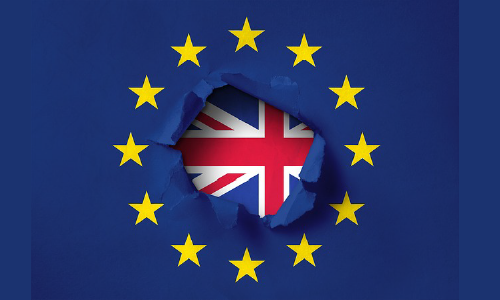The EU after Brexit with Professor Simon Usherwood, The Open University

Chaired by Dr Emma Clarence
Simon began the webinar by noting that for the EU, Brexit has been a relatively minor issue in its broader development. Brexit posed challenges, both politically and economically, for the EU, because this was the first time a major state had left since its creation, and concerns were expressed across the EU as to what future relations with the UK would be in a post Brexit context. However, even though difficulties persist post Brexit, including possible attempts by the British government to disapply parts of the Northern Irish Protocol, Brexit and its impact is not the EU’s most pressing concern.
The EU has had to deal with several crises during the past decade, or so, and has managed to weather their respective storms. For example, the Eurozone crisis of 2008-9 and the migration crisis in 2015, both of which raised questions about the ability of the EU to respond to problems of such magnitude. Also, there was the worsening of transatlantic international relationships following the election of President Trump in 2016. Nevertheless, the EU has shown remarkable resilience.
Moreover, Simon contended that the recent Covid crisis was, after initial difficulties, responded to in positive and concerted ways, including cooperation between member states to address healthcare emergencies and in the purchasing of vaccines and their distribution. Alongside these have been mutual funds to aid reconstruction programmes in parts of those EU which required them.
The webinar involved a lively Q&A. One area explored was the current main political preoccupations of the EU and how it sees itself moving forward as a political entity. A common thread to Simon’s answers to these questions was that in his view, one cannot see an overarching clearly defined purpose identified by the EU which guides its future direction, other than the fact that it wishes to support the spread of democracy and the rule of law. Its member states see the EU as broadly enhancing their individual and collective opportunities for development.
It was also suggested during the webinar that, for some political commentators, the EU can appear to be an unwieldy and slow-moving political body. However, recent crises, such as the war between Russia and Ukraine, as well as Covid, have shown that the EU can take substantial collective steps forward when it needs to, ones which demonstrate the EU's ability to act in an effective manner.
Questions were also asked about Brexit and whether it was an inevitable result of the UK being part of the EU, and what might result from another EU state leaving. Simon highlighted that there are many more states who wish to join the EU than leave it. Furthermore, since the processes involved in Britain leaving the EU were very complicated, it may well deter other states from trying to leave. But if this was to occur, especially by a large EU state, this could pose an existential crisis for the EU.
The webinar also explored how the EU is a fluid and constantly changing political organisation, and that different member states, at various points in its history, have come to the fore as regards attempting to steer the political direction of the EU. This was seen, for example, in the leadership of the EU by Germany, particularly after the Eurozone crisis of 2008. With France’s President Macron’s re-election, there may be an increased prominence of France’s political influence over the EU, especially since Macron is committed to forging a more integrated Europe.
As a parting observation, Simon stressed the importance of the need to keep an eye on how current political challenges, such as that posed by unresolved problems surrounding how to keep, and implement, the post-Brexit Irish Protocol, are being addressed by the EU. And internal challenges for the EU remain in terms of it being made to be, and to appear, more democratically accountable to its citizens. By doing so, we will be able to witness how far the EU remains able to withstand such challenges and how they affect the future direction of the EU’s political journey.
Request your prospectus
![]()
Explore our qualifications and courses by requesting one of our prospectuses today.
